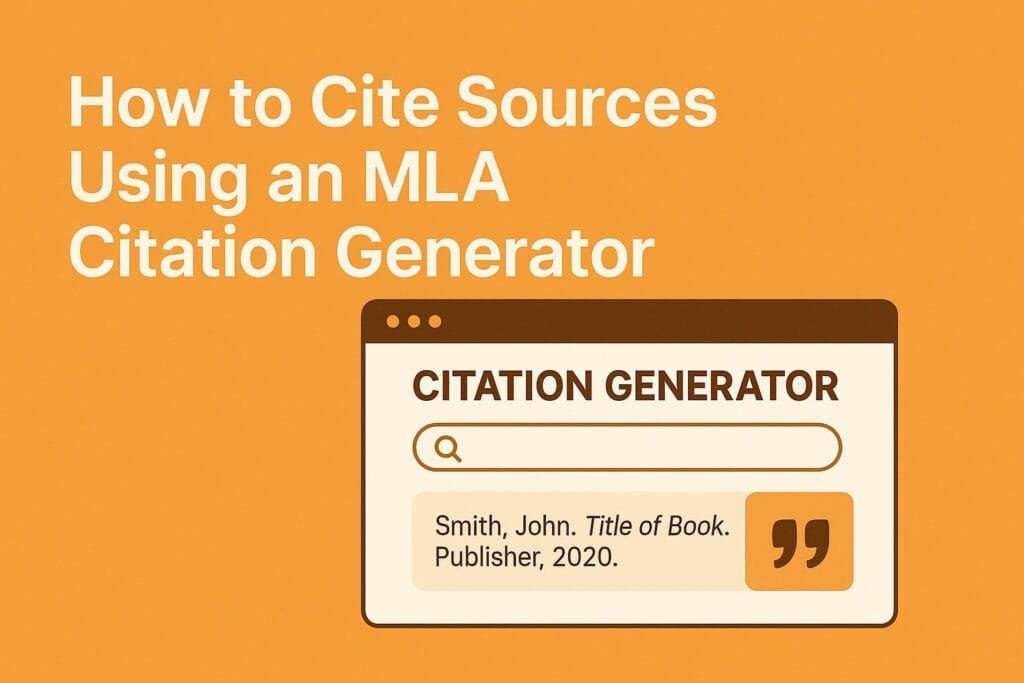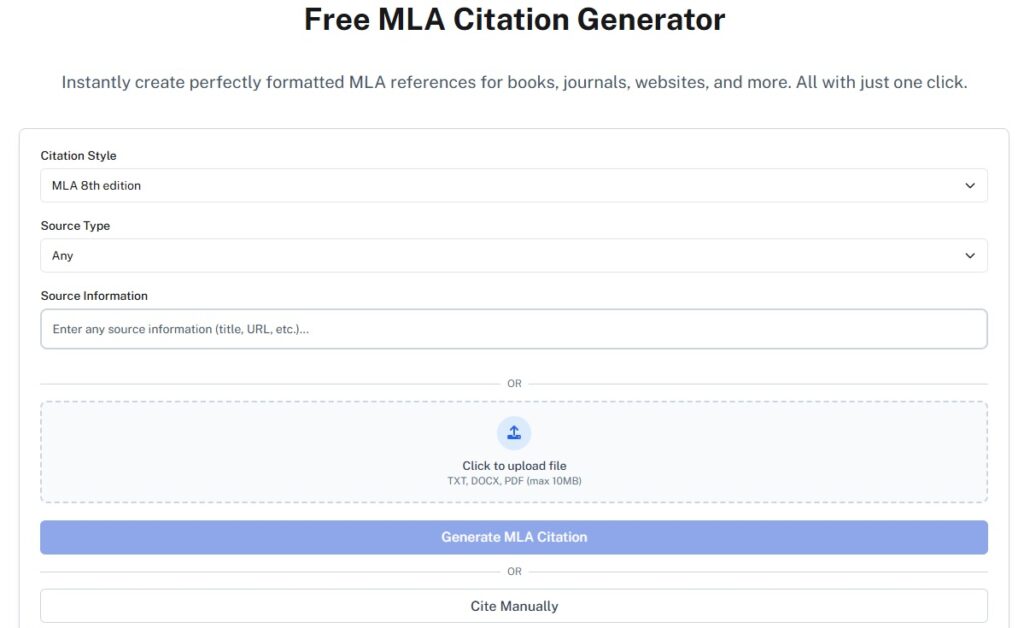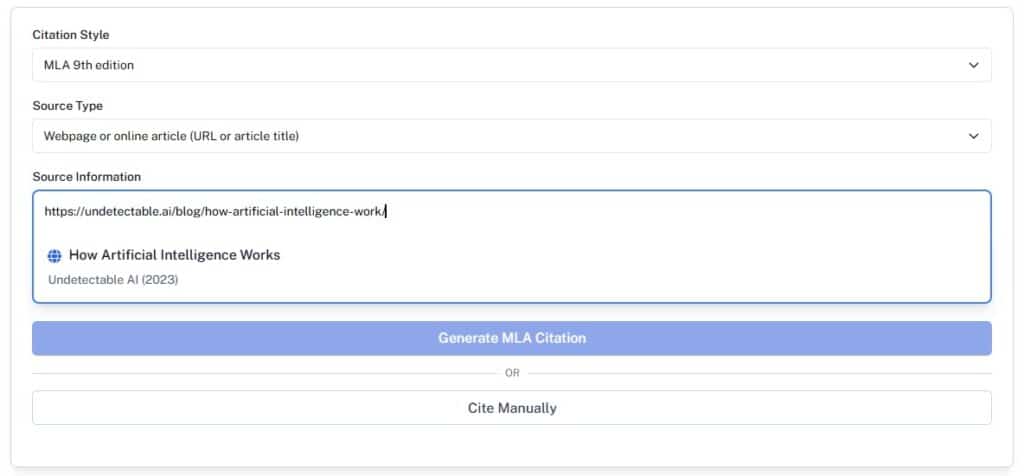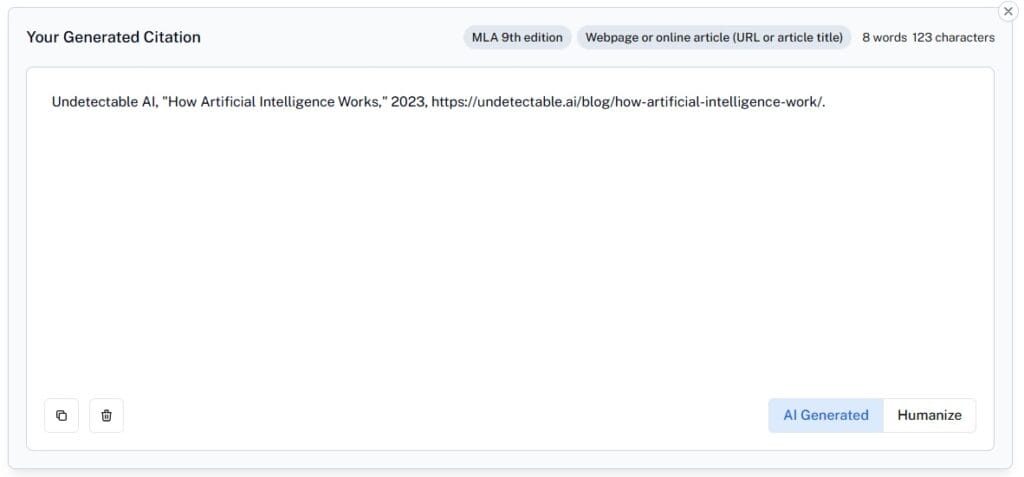The Modern Language Association (MLA) is a citation style used for academic work in the humanities. Because most schools require at least a few humanities courses, odds are you’ll end up using MLA.
The guidelines for MLA citation format are pretty precise, sometimes picky, and they keep getting updated.
So, it takes a lot of effort to stay up to date with them if you try to cite manually.
An MLA citation generator makes referencing very, very easy. All it needs from you is a source identifier, and then it pulls the right metadata, formats it instantly, and leaves you free to focus on your actual paper.
In this article, we discuss what an MLA citation generator is, how to use it, some of its benefits, and the best practices to make the most out of it.
Key Takeaways
- MLA citation generators automatically format your sources in Modern Language Association (MLA) style.
- It’s very easy to use them. You just need to pick the correct source type, enter a title/URL/DOI/ISBN identifier, review the output, and drop it in your paper.
- A citation generator saves you money compared to paid tools like EndNote or Mendeley, stays current with MLA’s changing rules, and dramatically speeds up the citation process.
- Undetectable AI’s MLA Citation Generator is a feature-rich solution with unlimited free use, wide source coverage, MLA 9 compliance, manual editing, and project-saving options.
What Is the MLA Citation Generator?

The MLA citation generator is a tool used to cite sources in the Modern Language Association style in your academic work.
We use it so that we don’t have to painstakingly remember the order of author names, italics, commas, and other formatting requirements.
The tool turns the tedious, headache-inducing part of research into a quick step.


Never Worry About AI Detecting Your Texts Again. Undetectable AI Can Help You:
- Make your AI assisted writing appear human-like.
- Bypass all major AI detection tools with just one click.
- Use AI safely and confidently in school and work.
It requires you to simply input the details of your source, i.e., the authors, title, publication date, and URL, and the generator does the formatting for you.
The MLA citation style is primarily used in humanities research.
Key Features of Our MLA Citation Generator
The following features of Undetectable AI’s free MLA citation generator make it a great tool:
- It offers unlimited usage, which means you can make it generate as many citations as your heart (and your research paper) desires without any login hoops.
- The tool is smart enough to handle almost anything you throw at it, including journal articles, webpages, PDFs, books, etc.
- It’s fully compliant with MLA 9 referencing guidelines.
- You get perfectly formatted citations and in-text citations, and ready to drop into your paper.
- If you’re the hands-on type, there’s a manual mode too that allows you to edit your citations exactly how you like them.
- You can group your sources by project, save them, and export them as a .txt or copy them directly into your document
How to Use Our MLA Citation Generator
Using the Undetectable AI MLA Citation Generator is surprisingly simple. All it needs from you is a basic identifier, i.e., a title, URL, DOI, or ISBN, and the tool does the rest.
Follow these steps to generate a citation in the MLA format:
Step 1: Choose Your Source Type
The first thing the Undetectable AI MLA Citation Generator asks you is the kind of source you are working with.
MLA citations have different rules and requirements for different source types, and naturally, the details needed to cite a book are very different from a website, a journal article, or a YouTube video.
If you pick the wrong source type, you’ll end up with irrelevant fields in subsequent questions.
Give it the right source type at the start, and the generator will know exactly which pieces of information it needs from you and how to arrange them in the correct MLA format.

Step 2: Enter your source details
After you’ve selected the source type, the next step requires you to provide the actual information about the source.
The tool makes it very easy because you don’t have to fill in every single box by hand.
You simply paste in identifiers like the title, URL, DOI, or ISBN, and the generator then searches for the full details and fills them in automatically.
For example, if you paste the ISBN of a book, the tool will find the author’s name, the book title, the publisher, and the year.
Let’s try it out by using a blog post, “How Artificial Intelligence Works,” published at Undetectable AI.

Step 3: Review and customize
Once you have your citation produced, take a moment to review it thoroughly.
Look at the title and make sure capitalization follows MLA’s title case rules.
Confirm that the publisher is listed properly and that unnecessary information isn’t included.
For online sources, see if the URL is present, and add an access date if your teacher requires one.

The Undetectable AI tool allows you to edit any of these details manually, so you can adjust them until everything matches your requirements.
Step 4: Copy your MLA citation
When you’re satisfied that the citation is correct, you can simply copy it to your clipboard and paste it directly into your paper.
If you’re working on several citations, you can also save them to a project within the tool.
The feature is very helpful for those working on long projects since it keeps all citations organized in one place for you to export them.
When pasting your citation into your document, don’t forget to apply MLA formatting rules of double spacing and a hanging indent.
Finally, make it a habit to keep a backup of your citations for your own peace of mind.
What Is the Best MLA Citation Generator?
There’s not a lot it takes to call an MLA citation generator “the best.”
Here’s what it should offer:
- MLA style requires attention to minute details like italicizing book titles, using quotation marks for articles, or knowing when to shorten author lists with et al. It goes without saying that a good generator should handle all of that without introducing errors.
- The generator also needs to support all types of sources, including but not limited to books, websites, journal articles, podcasts, YouTube videos, tweets, conference papers, online reports with no listed author, etc.
- The MLA rules tend to get updated every few years. MLA 9th edition is the most recent standard, which brought many changes to the 8th edition. The best generator is one that keeps up with these changes.
- A tool can be accurate and thorough, but for it to be used consistently, it should also have a clean design where you can simply paste an identifier and it does the job for you.
Undetectable AI MLA Citation Generator performs pretty impressively against this checklist.
It reliably pulls metadata and arranges it in correct MLA style. The coverage is wide and supports almost all types of sources.
On formatting, it aligns with the latest MLA guidelines, so you won’t get tripped up by outdated rules. And above all, it is very, very easy to use.
In simple terms, it checks all the boxes that make a citation generator worth calling “the best.”
Benefits of Using MLA Citation Generator

Using an MLA citation generator comes with several clear benefits that go beyond just convenience.
Probably its biggest benefit is that it reduces the chance of errors. Such a tool is solely for MLA style, and there remains little room for accidental, unwanted referencing styles.
Also, Undetectable AI’s MLA citation generator is very easy to use when compared to citation managers like EndNote or Mendeley.
ou don’t have to spend a dime, install bulky software, or learn how to manage reference libraries.
It’s a very practical solution for students who just want accurate citations without adding another subscription to their budget.
MLA has gone through several editions, and its required referencing rules do change with every edition.
The generator stays current with these changes, which means you don’t have to keep track of new rules or worry that you’re accidentally using outdated formatting.
That peace of mind is worth a lot!
And of course, it’s fast. What could take you 10–15 minutes of flipping through a handbook can be done in seconds. Paste the title, DOI, or ISBN, let the tool fetch the details, and you’re done!
Best Practices for Using MLA Citation Generator
Like any tool, an MLA Citation Generator only works as well as the person using it.
If you want your MLA citations to be flawless, here are a few best practices worth following.
- Always double-check the details you enter. The generator can only work with what you give it. If you paste incomplete info, it will pull incorrect metadata. Make sure the information you have entered is clean and reliable.
- Review every citation and pay close attention to the author’s name order, capitalization of titles, punctuation, and whether “et al.” has been applied correctly. It is your job to ensure that the generator follows accurate MLA formatting rules.
- If you only need to cite one source, copying and pasting is fine. But when building a full Works Cited page with ten or more sources, use the tool’s project-saving and exporting options.
- Remember that MLA has requirements beyond the citation text itself, i.e., double spacing, hanging indents, and consistent font. The generator won’t fix those for you. After pasting your citation into your paper, adjust the formatting in Word or Google Docs.
Feel free to check out our AI Detector and Humanizer in the widget below!
Conclusion
We’re lucky to be in a time when automation takes a huge chunk of grunt work away.
Not so long ago, students had to painstakingly flip through style handbooks, double-check every comma, and hope they didn’t miss an italic somewhere.
Now, with tools like the MLA citation generator, that process is cut down to seconds.
It saves you time, it saves you money since you do not need to spend on reference managers, and best of all, it doesn’t cost a thing.
If you’re serious about making your research workflow smoother and faster, an MLA citation generator should be your go-to tool.
Try Undetectable AI today and simplify your writing process with confidence.
